#but i don’t want to comment on any specific issue because i’m not the arbiter on right and wrong
Explore tagged Tumblr posts
Text
hot take but i think that if we want thomas to put out content more frequently by making shorter things that require less effort then we also have to do our part.
thomas has a lot of pressure because he probably feels that he must keep this reputation of a perfect guy who never fails to make children smile and teach people of all ages important lessons on mental health etc. in order for him to be comfortable putting out simpler content we have to understand that he will make mistakes while doing it. because if he has to ensure every video is perfect and has months of dedicated research to back it up, then that causes videos to take so long or never get made.
if thomas decides to try putting out content like that sleep documentary more often then we have to be prepared to forgive him for mistakes instead of scaring him off by scrutinizing every single word he says.
i know thomas is an adult with a decade of experience on social media and i’ve said before that most criticism on this site is probably pretty inconsequential since it’s properly tagged and easy to avoid. but i want to just talk about this because probably people talk about criticism points from tumblr also on twitter where it will unpredictably show up on thomas’s timeline, or on youtube comments.
and i’m also not talking about big stuff and also the difference between what is a “small” and a “big” mistake and what each person is prepared to forgive is very subjective* but. but i just think we need to be aware of this. if thomas uses a word that’s a bit insensitive, makes a joke that’s out of touch, references something problematic, relies on a stereotype to portray a character, stuff like that then. we can try to bring it up so he is aware of the mistake but in moderation (making an attempt to see if there’s not already a hundred comments about it already, for example) and with kindness and just… approach the issue with good faith.
because if he puts out a short sanders sides inconsequential episode and uses a word he shouldn’t have and a bunch of people interpret that as him not caring about an entire demographic or him having terrible bigoted beliefs or him not caring about the show at all or stuff like that then he will feel discouraged and then we all lose. he must be held accountable for his actions but there are ways to do it that don’t involve interpreting an unfortunate phrasing or joke as him having the worst intentions in the world.
we cant demand perfect content that is also frequent. and most of us understand by that that we don’t need big big productions that address big big issues, but also we have to understand that we shouldn’t demand perfection in thomas’s awareness on social justice issues or in his keeping track of plot details or in his vocabulary or his use of language either. he’s a youtube comedian, after all. not a politician or somebody working at marvel or netflix or whatever.
i don’t know what’s right or wrong and i don’t know what exactly constitutes the set of “small” mistakes that we should be prepared to forgive but i think that if we all take a minute to think twice before judging him then it’ll be better and maybe he can feel more calm about creating content. which would be awesome because i love him and i want him to enjoy the process of creating. so. these are my thoughts.
#* im still trying to figure out what this means in my personal case#ts criticism#this isn’t about anything in particular but#i have several instances in my head of reading people’s complaints on some things thomas said#(some recent and some that are years old)#that i just think were out of proportion#and i don’t like seeing that#but i don’t want to comment on any specific issue because i’m not the arbiter on right and wrong
39 notes
·
View notes
Text
Yay Burn Up My Heels is done. Oh no, Frangi why so many loose ends aaaaaarghhh.
Zombie author here will provide some notes on my ending, but as always the fic stands or doesn’t by itself. Whoever reads is the final arbiter. The fic is posted! I, as the author, am DEAD.

So leaving loose ends is my MO and I've stopped apologizing for it. I bind my stories thematically which means they don't necessarily have closed endings. But they do conclude the specific plot in motion. Burn's A-plot was always bringing the lightsaber back, it's B-plot was Mara's coming of age -- told as a romance (as much as Stone’s was a coming of age told as a captivity narrative, and Citadel was a straight-up gothic, I have written about coming of age here and here). She gets on a path to self actualization through discovering her affinity with someone who, on paper, is nothing like her (by virtue of being a colonial streetwalker etc). Ultimately, her abandonment issues come to play making it so she chooses loyalty above herself, but she returns to the Empire with a goal of making things better which of course blows up in her face. The end for Mara is her worst nightmare come to pass being cut loose from her master, the Empire, being tarred as a criminal, tortured and slated for execution. Oh nooooo.
Have we forgotten that the Empire is a piece of shit? That Mara ultimately doesn't mean anything to the Emperor? He doesn't even set out to hurt her in how I think of the final events, he just point blank doesn't give a shit and lets ISB have their way with her. It's very cruel, but this gets her out of the Empire pretty quick in her tenure (she's 18-19 tops), a good three-four years before canon.
Now what's going on with Luke? The key to that is actually in the dialog our pov imperial overhears:
"It's not really bounty hunting. More like being in the know. It's like that thing the small-time organizations do now," the ensign was saying, loud enough for Ventfor to hear several paces away. "Say Black Sun wants Crymorah middle management out of their hair. But the Crymorah know, they've been enemies for a long time, so there's no element of surprise, right? That's where the little guys come in—unaffiliated small-timers. No one knows them, so they keep their head down, keep their ears open. One day they surprise the vigo, grab him for the big timers. They don't kill him, though. They comm it in -- for a price."
[...]
"They make sure the vigo is easy prey. They cripple him," the ensign continued. "Leave him limping in a dark alley or something," he laughed. "Big-timers want the bastard dead, right? They want to send a message, want the bragging rights for the kill shot, the turf, what's in his pockets -- but without the risk of the other guy getting the drop on them. So these small-time players, they eat the risk without the bragging rights, without the fame. It's not direct, see? They're not the ones pulling the trigger. That's one of the ways they keep a low profile, make their credits, and get those who know not to fuck with--"
Sub in Black Sun and Crymorah for the Empire and Son-Tuul and that describes what Luke’s group is going. They crippled the Star Destroyer then called it in so the Son Tuul could get their payback (Mara mentions Vader destroyed the Son Tuul’s HQ in the transcript that opens the chapter, this is a comics easter egg) .
And if oh any of this sounds like information brokering with a kick (lol literally?), then that’s kind of funny, no?
In Ch 30 Luke had seemed quite interested in the fact that Force users could find locations (Mara finding the Hand of Judgement is in Choices of One):
“I don’t know. They just disappeared. Last time I worked with [LaRone and his men] I had to use the Force to find them --”
He leaned forward slightly, expression shifting to curiosity but no less intense. “Wait. Using the Force? Like the -- the healing? How?”
She waved a hand. “It’s hard to explain, you just kind of focus on what you want to find -- anyway, I tried to look into ISB -- the Imperial Security Bureau to see where I could lodge an appeal on their behalf, but I didn't get too far.”
It’s been six months since this. Luke’s obviously kept very very busy and there’s been a lot of Force-ish stuff going on between the lines among both of them (in VotF it’s mentioned how Luke and Mara were always kind of sensible to each other --that regardless of the bond they had been in tune sort of, this fic takes up that idea on the dl. As they grow closer Mara feels what Luke feels more strongly, by the end she has his nightmare). Is he a Jedi like the Imperials are freaking out about? Did they witness some Mandalorian-style hallway throwdown? LOL NO. But they did see that lightsaber batting bolts and hacking down people left and right, which is sufficient to raise the alarm and have them send the footage to Coruscant. So oooh what does this meaaaaan-- safe to say Luke and Mara won’t be under the radar for that long.
Why the stylistic change?
I decided to do a transcript because I felt a full-on interrogation from Mara’s pov was unnecessary. I tend to think these kinds of scenes are kind of gratuitous when written blow by blow. In Ricochet, I showed the beginning of one and then cut. Here I liked the depersonalizing effect of having the transcript erase her name and communicating the interviewer’s contempt through tone as well as Mara’s own state through the way her speech becomes more fragmented before she tries to marshal herself together to voice the injustice of what she’s being put through (as best she can in her situation).
As for the Imperial pov, as I mentioned in a comment, canon is SATURATED with breakout scenes. I based this one heavily on ANH, DFR, and Lords of the Sith (though that one wasn’t a breakout as much as a break in). To do something a little different, I thought Imperial pov could give me some interesting beats. I love ending with a female voice on the comm making a kind of sexualized threat (“You’re looking a little...lonely. Maybe we can help”) that ties into the thematics of the fic at large. Why yes, my faves were very, very lonely and while hardly getting a hearts and flowers ending, they’re certainly not lonely now, which is my conclusion to the B-plot.
B-plot-wise I’m back in my own terrain. For several years now I’ve been writing about a girl, her imperial conditioning, and the boy who adamantly refuses to give up on her. I still think it’s a compelling story to tell. Thank you thank you thank you again to all who have joined me!
15 notes
·
View notes
Text
Trump Clears Three Service Members in War Crimes Cases https://nyti.ms/2CPN4qu
Trump is once again abusing his authority and presidential authority, signaling to those who defy Congress or break the law, that he'll pardon them. THIS IS SHAMEFUL AND DISGUSTING!!!
Trump Clears Three Service Members in War Crimes Cases
The moves signaled that as commander in chief, Mr. Trump intends to use his power as the ultimate arbiter of military justice.
By Dave Philips | Published Nov. 15, 2019 Updated 7:44 PM ET | New York Times | Posted November 15, 2019 |
President Trump cleared three members of the armed services on Friday who have been accused or convicted of war crimes, overruling military leaders who had sought to punish them. All three have been championed by conservative lawmakers and commentators, who have portrayed them as war heroes unfairly prosecuted for actions taken in the heat and confusion of battle.
In a statement released by the White House late Friday, Mr. Trump announced that he was ordering the full pardon of Clint Lorance, a former Army lieutenant, from the military prison at Fort Leavenworth, where he is serving a 19-year sentence for the murder of two civilians.
He ordered the full pardon of Maj. Mathew L. Golsteyn, an Army Special Forces officer who was facing murder charges for killing an unarmed Afghan he believed was a Taliban bomb maker.
And he reversed the demotion of Chief Petty Officer Edward Gallagher, a Navy SEAL who was acquitted of murder charges but convicted of a lesser offense in a high-profile war crimes case over the summer.
“The President, as Commander-in-Chief, is ultimately responsible for ensuring that the law is enforced and when appropriate, that mercy is granted,” the White House statement said. “As the President has stated, ‘when our soldiers have to fight for our country, I want to give them the confidence to fight.’”
The moves signaled that as commander in chief, Mr. Trump intends to use his power as the ultimate arbiter of military justice in ways unlike any other president in modern times.
Top military leaders have pushed back hard against clearing the three men. Defense Secretary Mark Esper and Army Secretary Ryan McCarthy have argued that such a move would undermine the military code of justice, and would serve as a bad example to other troops in the field, administration officials said.
Mr. Trump’s actions were first reported by The Washington Post. They were previewed last week on the Fox News show “Fox & Friends” by one of the hosts, Pete Hegseth, who said he had spoken to the president and described him as having “fidelity to the war fighter.”
“The president looks at it through that lens, a simple one, and important one,” Mr. Hegseth said, adding, “The benefit of the doubt should go to the guys pulling the trigger.”
A Navy official said SEAL leaders first learned of the plans from the Fox News broadcast, and since then have lobbied against clearing Chief Gallagher.
The three men have been portrayed in conservative media outlets and social media posts as dedicated warriors battling enemies who wear no uniforms and follow no laws of war, only to be unfairly second-guessed by military lawyers and commanders far from the scene of battle.
Mr. Trump echoed their frustration on Twitter in October, saying about Major Golsteyn, “We train our boys to be killing machines, then prosecute them when they kill!”
Experts were unable to name any other recent case of a member of the American armed forces receiving a presidential pardon for a violent crime committed in uniform, except for one granted by Mr. Trump in May. And it was strikingly unusual, they said, to clear a soldier of murder charges before the case is tried.
“I’m not sure it’s ever been done,” said Gary Solis, a retired military judge who served as an armor officer in Vietnam.
Referring to the only soldier convicted in the gruesome My Lai Massacre of civilians during the Vietnam War, Mr. Solis said: “People think Nixon pardoned Lieutenant Calley, but he didn’t. Calley was paroled.”
Presidents all the way back to George Washington have granted pardons to tens of thousands of American troops, but nearly all were young men who deserted or who evaded a draft, and received clemency after the fighting ended.
While the new pardons are a stark departure from tradition, they are in line with Mr. Trump’s many statements during his campaign and in office, arguing that to beat unconventional enemies like the Taliban and ISIS, the American military should loosen the reins on how troops behave in conflict zones.
“You have to play the game the way they are playing the game,” he told NBC News in 2016.
The specific circumstances of the three men’s cases defy easy characterization. In one, a decorated captain admitted to a killing in a job interview. In the other two, platoon leaders’ illegal actions were reported not by superior officers or Pentagon lawyers, but by their own platoons.
Troops who testified in those two cases, against Lieutenant Lorance and Chief Gallagher, voiced disappointment and disbelief over Mr. Trump’s plans for clemency before they were announced.
“The tragedy of pardoning Lorance isn’t that he will be released from prison — I’ve found room for compassion there,” said Patrick Swanson, a former Army captain who was Lieutenant Lorance’s company commander in Afghanistan. “The tragedy is that people will hail him as a hero, and he is not a hero. He ordered those murders. He lied about them..”
Mr. Lorance was a rookie Army lieutenant who had been in command of a platoon in Afghanistan for two days in July 2012 when he ordered his troops to fire on unarmed villagers who posed no threat, killing two men. He then called in false reports over the radio to cover up what had happened. He was immediately turned in by his own men.
Mr. Lorance, whose story is the subject of a new documentary series, was convicted of second-degree murder by a court-martial in 2013, and he has been in prison since then, serving his sentence at Fort Leavenworth in Kansas.
Major Golsteyn was charged in 2018 with premeditated murder over a killing that took place in 2010, when he was a captain in the Army Special Forces leading a team during Operation Moshtarak, one of the biggest combat operations of the war in Afghanistan. He admitted in a job interview with the C.I.A. the following year that, during the battle, he had killed a suspected bomb maker who had been captured and released, saying he had done so to protect civilians and his own men.
An initial Army investigation resulted in a reprimand but no charges. However, after Major Golsteyn publicly admitted the killing during a 2016 interview on Fox News, the Army reopened the case and charged him with premeditated murder.
Chief Gallagher was charged by the Navy in 2018 with shooting civilians in Iraq, killing a captive enemy fighter with a hunting knife, and threatening to kill fellow SEALs if they reported him, among other crimes. The charges stemmed from a 2017 deployment in Iraq when he was a chief petty officer leading a SEAL platoon.
After a tumultuous trial, he was acquitted by a military jury in July of all charges except one minor count: bringing discredit on the armed forces, by posing for a photo with the corpse of the captive he was accused of killing.
Though Chief Gallagher could have been demoted to the lowest rank in the service as a result, the top admiral in the Navy decided in October to demote him by just one step, to petty officer first class.
Mr. Trump had already intervened in the Gallagher case, ordering him moved to less restrictive confinement to await trial, and has posted supportive messages on Twitter. The Gallagher family has repeatedly urged the president in social media posts to step in again.
“Given his service to our Nation, a promotion back to the rank and pay grade of Chief Petty Officer is justified,” the White House statement said.
The Navy had been planning additional punishment for Chief Gallagher. Timothy Parlatore, one of Chief Gallagher’s lawyers, said the chief was told to appear before SEAL commanders on Nov. 1 at Naval Base Coronado near San Diego so they could remove his Trident pin, signifying that they were officially kicking him out of the SEAL teams. Navy leaders also planned to take away the Tridents of three officers who knew of the platoon’s allegations against Chief Gallagher but did not report them.
But Chief Gallagher waited all day at the base while commanders sought approval for the action from top Navy officials and the White House, which never came, according to a Navy official briefed on the meeting. Plans to punish all four of the SEALs are now on hold, the official said.
Mr. Parlatore welcomed the president’s intervention.
“It shows leadership,” he said, because SEAL commanders had become “so blinded by their unhealthy fixation on Eddie Gallagher, and it was time for an adult in the room to stand up and say, ‘Enough.’”
The White House initially made preparations to issue more pardons on Memorial Day but held off after encountering fierce resistance from military leaders and prominent veterans. Among them was a former chairman of the Joint Chiefs of Staff, Gen. Martin Dempsey, who wrote on Twitter: “Absent evidence of innocence or injustice the wholesale pardon of US servicemembers accused of war crimes signals our troops and allies that we don’t take the Law of Armed Conflict seriously. Bad message. Bad precedent. Abdication of moral responsibility. Risk to us.”
The men cleared by the president offered thanks Friday. On his Instagram account, Chief Gallagher, who a year ago had been facing the prospect of life in prison, thanked his family and thousands of supporters, and praised the president.
“I truly believe that we are blessed as a Nation to have a Commander-in-Chief that stands up for our warfighters, and cares about how they and their families are treated,” he wrote. “Our military is the best in the world, and with steadfast and supportive leadership; like we have in this president, our fighting force will only get stronger.
🍁🍞🍂☕🍁🍞🍂☕🍁🍞🍂☕🍁🍞
I Served in the Army. Trump’s War Crimes Decisions Are Not Pro-Military.
By intervening, the president undermines the moral standing of the armed forces.
By Benjamin Haas, Mr. Haas is advocacy counsel at Human Rights First | Published Nov. 15, 2019 | New York Times | Posted November 15, 2019 |
President Donald Trump on Friday cleared three military service members of war crimes, even after being reportedly advised against doing so by Defense Secretary Mark Esper and Army Secretary Ryan McCarthy. Mr. Trump interceded on behalf of Army Maj. Mathew Golsteyn, who had been charged with murdering an Afghan man; Edward Gallagher, a Navy SEAL who was convicted in connection with posing for a photo with the corpse of a fighter in Iraq; and Army First Lt. Clint Lorance, who, after nine fellow unit members testified against him, had been convicted of murdering two civilians in Afghanistan.
Mr. Trump may believe that intervening pays respect to those who have served in uniform, that it shows he’s “pro-military.” But if this is his view, he’s wrong. In reality, Mr. Trump’s meddling undermines the military’s institutional values, risks endangering American service members, and disrespects the honorable service of the overwhelming majority of veterans.
The military strives to ensure that its members adhere to the laws of war and respect human rights. Service members are trained, for example, to avoid civilian casualties by understanding rules of engagement and following the proper steps for escalation of force. They also learn the appropriate ways to treat detainees, and interrogators are trained to employ only the approved, legal methods.
During my two deployments to Afghanistan, my intelligence work helped lead to the capture of insurgent leaders. Sharing responsibility for their capture and as a recipient of the intelligence produced by their interrogations, I had a sense of moral reassurance in the understanding that my colleagues handled and interrogated the detainees humanely — just as they had been trained.
The lessons service members learn about the laws of war are not an afterthought. Rather, they are central, emphasized time and again — from training sessions and exercises, to military ethics discussions, to actual combat deployments. The Army’s official values, after all, demand that soldiers “do what’s right, legally and morally” and “treat others with dignity and respect,” making no exceptions for civilians or even enemies.
The military requires its members to operate in accordance with the laws of war for good reason. Disregarding the laws of war — which Mr. Trump has done by intervening in these cases — jeopardizes mission accomplishment and the safety of service members; excessive civilian casualties, for example, can stimulate further violence, turn local populations against American forces, and discourage allies from collaborating with the United States. Mr. Trump should realize that the laws of war actually serve to benefit our armed forces.
Against this backdrop, Mr. Trump’s intervention on behalf of those convicted or accused of conduct falling short of the military’s crucial legal requirements and moral expectations undermines the training in which the military rightly invests so much effort. It trivializes the values the military spends so much time fostering. He could be endangering United States service members deployed to combat zones by handing their enemies propaganda and recruitment material and by degrading support among local populations.
To be sure, war is complex, and service members accordingly face difficult moral choices under extraordinary pressure. But their preparation helps them make sound decisions in these tough situations, and the military justice system considers the factual circumstances of each case and the intent of the actor.
Mr. Trump appears to be following in the unfortunate footsteps of President Richard Nixon. In the wake of Lt. William Calley’s murder conviction in connection with the Vietnam War’s My Lai Massacre, President Richard Nixon intervened on behalf of Mr. Calley. In a response to Mr. Nixon that rings true today, Capt. Aubrey Daniel, the military prosecutor in the case, wrote:
“Your intervention has, in my opinion, damaged the military judicial system. … I would expect that the president of the United States, a man whom I believed should and would provide the moral leadership for this nation, would stand fully behind the law of this land on a moral issue which is so clear and about which there can be no compromise.”
Mr. Trump, to the detriment of the United States Armed Forces, remains fixated on condoning the aberrant conduct of those convicted or accused of flouting the laws of war. He should have left the military justice system do its job. But perhaps this is not surprising, considering that Mr. Trump himself has recently advocated a war crime — the appropriation of oil in Syria.
______
Benjamin Haas served as an intelligence officer in the Army and was deployed to Afghanistan twice.
🍁🍞🍂☕🍁🍞🍂☕🍁🍞🍂☕🍁🍞
Trump issues pardons in war-crimes cases, despite Pentagon opposition to the move
Dan Lamothe | Published November 15, 2019 at 7:30 p.m. ET | Washington Post | Posted November 15, 2019 |
President Trump intervened in three military justice cases involving war-crimes accusations Friday, issuing at least two full pardons that will prevent the Pentagon from pursuing future charges against the individuals involved, according to two of their lawyers and a U.S. official.
The service members involved were notified by Trump over the phone late Friday afternoon, said the lawyers, who represent Army Maj. Mathew L. Golsteyn and former Special Warfare Operator Chief Edward Gallagher, a Navy SEAL. Golsteyn faced a murder trial scheduled for next year, while Gallagher recently was acquitted of murder and convicted of posing with the corpse of an Islamic State fighter in Iraq.
The third service member involved, former 1st Lt. Clint Lorance, was expected to be released from the U.S. Military Disciplinary Barracks at Fort Leavenworth in Kansas as soon as Friday night. He was convicted of second-degree murder in 2013, and sentenced to 19 years in prison for ordering his soldiers to open fire on three men in Afghanistan.
It was not immediately clear whether Lorance will receive a full pardon or have his sentence shortened through commutation.
The calls were made at the tail end of a day dominated by impeachment hearings against Trump, and after days of efforts by some senior Pentagon officials to change his mind, according to three U.S. officials. The officials, who also spoke on the condition of anonymity, said that some commanders have raised concerns that Trump’s move will undermine the military justice system.
Other U.S. officials and advocates for the service members involved have said that adopting the president’s desires in the military justice system should not be difficult. It typically has commanders overseeing the process in the military’s chain of command, with Trump serving at the top of that system as commander in chief.
In all three cases, advocates for the service members had blasted the Pentagon for its handling of their cases, detailing what they saw as questionable actions by prosecutors and investigators. Their cases have been featured on conservative media frequently in recent months, as they also prepared cases for the president behind the scenes.
Golsteyn, who went from being decorated with a Silver Star for valor in Afghanistan to facing years of investigation and a court-martial in the 2010 death of a suspected bomb maker on the same deployment, said in a statement that his family is “profoundly grateful” for Trump’s action, and that they have lived in “constant fear of this runaway prosecution” by the Army.
“Thanks to President Trump, we now have a chance to rebuild our family and lives,” Golsteyn said. "With time, I hope to regain my immense pride in having served in our military. In the meantime, we are so thankful for the support of family members, friends and supporters from around the nation, and our legal team.”
Gallagher’s lawyer, Tim Parlatore, said that his client received a phone call from the president with Vice President Pence also on the line.
“He told Eddie that he had certainly watched the case and that this was certainly the right thing to do given his years of service," Parlatore said. "The president was very familiar with the prosecutorial misconduct associated with the case. I think that certainly plays into his decision.”
🍁🍞🍂☕🍁🍞🍂☕🍁🍞🍂☕🍁🍞
#trump scandals#trump administration#president donald trump#trumpism#president trump#news today trump#trump cult#trump corruption#trump crime syndicate#trump crime family#impeachment inquiry now#impeach trump#impeachtrump#impeachthemf#impeachment#u. s. military#u.s. military#military#military intelligence#war criminals#war crimes#republican politics#politics and government#us politics#politics#breaking news#top news#trending topics#top stories google news
3 notes
·
View notes
Text
c
Below are screenshots of a long PM exchange between myself and an individual the name of RDMacQ.
It continues on from a very long series of exchanges beginning here and continuing here.
It starts off with interactions on a message board before spewing over into PM discussions.
Also below is well...what I would’ve responded to some of RDMacQ’s comments but chose not to so as to hopefully not drag the interaction out yet longer.
I post these so there partially out of catharsis but also so that there is a clear record of what happened and you need not merely trust my word on the discussion, his word, and indeed can cite it if I do make erroneous claims in reference to it. We can then look at it and discuss.
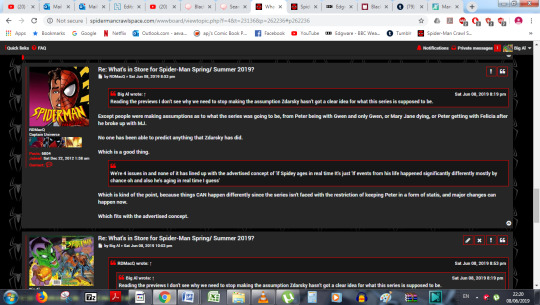
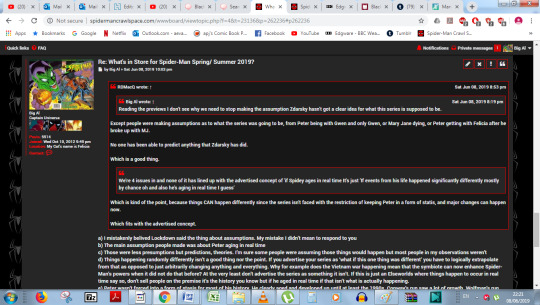
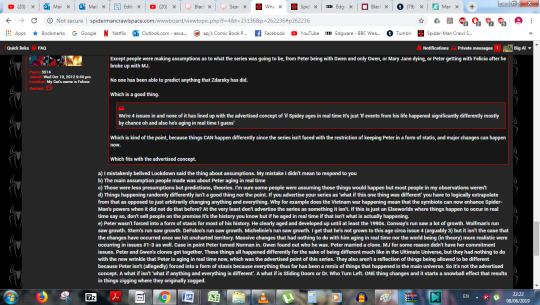
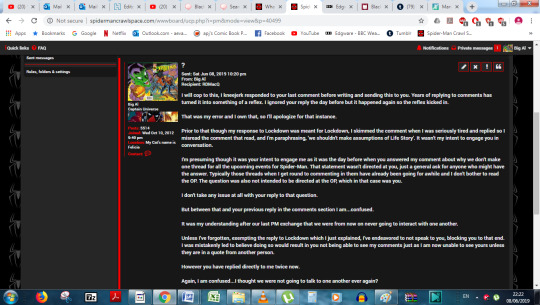


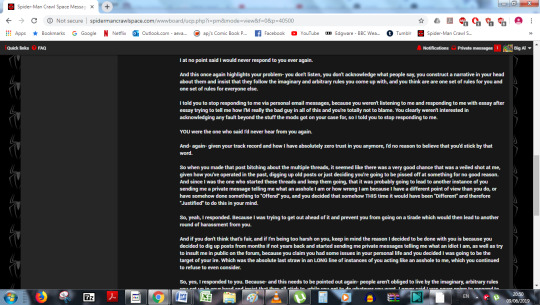
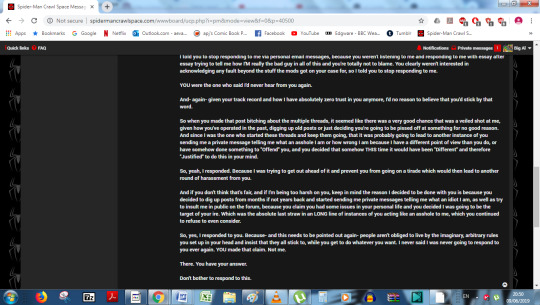
“And this once again highlights your problem- you don't listen, you don't acknowledge what people say, you construct a narrative in your head about them and insist that they follow the imaginary and arbitrary rules you come up with, and you think are are one set of rules for you and one set of rules for everyone else.”
That’s rich coming from you. I apologized multiple times, you didn’t acknowledge this and instead either deliberately or because you are just that stupid decided to take it that I didn’t apologize and instead said it was actually your fault.
And you demanded I not interact with you in your last PM so who’s making up the rules in their head again?
I misinterpreted but you make it out that I’m schizophrenic.
“I told you to stop responding to me via personal email messages, because you weren't listening to me and responding to me with essay after essay trying to tell me how I'M really the bad guy in all of this and you're totally not to blame. You clearly weren't interested in acknowledging any fault beyond the stuff the mods got on your case for, so I told you to stop responding to me.”
a) I also told you afterwards to stop interacting with me and you didn’t
b) I wasn’t going to stop interacting with you after you told me to stop because you’d lied and slandered. Why on Earth should I allow you to lie and insult me?
c) It’s rather rich arguing I responded to you with essay after essay when on multiple occasions you yourself responded with essay length posts. Including this one I am responding to now.
d) You talk about narratives in MY head. YOU are the one claiming I was saying you were the bad guy. I wasn’t. I never ever said that. That’s all inside your own head.
e) I also never said I wasn’t to blame, hence I apologized waaaaaaaaaay back in a PM literally entitled apology
f) Putting aside how I owned up to a mistake in the first PM of this exchange, the stuff I was at fault for was the things the mods got on my case for. Which I owned up to. All the other stuff YOU claim I am at fault for is only YOUR assessment. And we’ve established you aren’t that great at seeing the plain and the obvious. Hence you utterly misread that I was apologizing and wasn’t saying I was faultless and you were to blame for everything. I stated I was at fault and out of line in a big way then outlined where my anger regarding you comes from and elaborated that essentially there had been fault on both our sides, not fault only on yours
“YOU were the one who said I'd never hear from you again. ”
And I kept to that.
You however responded to a comment I didn’t address to you or indeed anyone specifically, which was an innocent question.
Then I responded to you by accident as I’d misread something you wrote as something Lockdown wrote, which I explained and apologized for.
That was a mistake but by that point you’d already interacted with me, you’d already broke what I’d taken to be an agreement of non-interaction.
My consequent interactions with you were to address this as I’d thought we had an agreement but 2 days in a row you’d talked directly to me.
“And- again- given your track record and how I have absolutely zero trust in you anymore, I'd no reason to believe that you'd stick by that word.”
You know...except for the fact I did.
“So when you made that post bitching about the multiple threads, it seemed like there was a very good chance that was a veiled shot at me, given how you've operated in the past, digging up old posts or just deciding you're going to be pissed off at something for no good reason. ”
I wasn’t bitching, it was an innocent question. I didn’t swear (which you accuse me of and just did btw). I wasn’t insulting anyone. I was just asking a question.
My God you talk about a narrative in my head but you are the one seeing an innocent question not directed at you or anyone else as a ‘veiled shot’ at you.
Also I already explained my ‘past operations’ were due to extreme extenuating circumstances. You are talking like I’ve been doing this for years on end when I haven’t. You are again demonizing and slandering me.
“And since I was the one who started these threads and keep them going, that it was probably going to lead to another instance of you sending me a private message telling me what an asshole I am or how wrong I am because I have a different point of view than you do, or have somehow done something to "Offend" you, and you decided that somehow THIS time it would have been "Different" and therefore "Justified" to do this in your mind. ”
This is some conspiracy level stuff. I asked a question. You take this as a veiled shot that going to lead to me attacking you in PMS.
I never even called you an asshole in any PMs to my recollection and if I did I apologize for that but I honestly don’t remember ever saying anything like that. Saying you were wrong sure, but never personally insulting you the way calling you an asshole would constitute.
I don’t even know what you are talking about with ‘different’ and ‘justified’. You just sound crazy.
“So, yeah, I responded. Because I was trying to get out ahead of it and prevent you from going on a tirade which would then lead to another round of harassment from you. ”
You are acting like every single time ever I’ve disagreed with you or stood my ground in opposition to your view I’ve harassed you.
I crossed the line in a big way by digging up one thread and sending you like 3 PMs across a year attacking your points. That was wrong I’ll admit, but you are acting like EVERy instance ever has resulted in something like that and it hasn’t.
It’s especially nuts in this instance because I just asked a question.
“And if you don't think that's fair, and if I'm being too harsh on you, keep in mind the reason I decided to be done with you is because you decided to dig up posts from months if not years back and started sending me private messages telling me what an idiot I am, as well as try to insult me in public on the forum, because you claim you had some issues in your personal life and you decided I was going to be the target of your ire. ”
You are indeed being way too harsh (and utterly unsympathetic); friendly reminder by the way I expressed sympathy for your own issues in our last long PM exchange. You are also being...crazy. I asked. A. Question. That was it. I didn’t criticise. I just asked why we do it one way instead of another. I didn’t respond to your answer. It made sense, it addressed my enquiry. That was it.
Also none of the things I dug up were from years in the past.
The only times I ever ‘insulted’ you on the forums were by calling you belligerent; no mod has ever called me on this so you know....either they agree or it’s not an insult in their eyes.
Not only is this entirely true (remember I’ve explained I wasn’t saying i was guiltless you were actually at fault, you just keep insisting that to be the case), but you yourself have insulted, accused and judged me publicly on the forums. I’ve not been the only person you’ve done that to either.
Yeah I decided you were the target but I explained and apologized for that in my very first PM in this saga of ours.
“Which was the absolute last straw in an LONG line of instances of you acting like an asshole to me, which you continued to refuse to even consider. ”
I don’t refuse to consider it, hence I apologized at the very start which you ignorantly keep ignoring. Notice I’ve not called you an asshole once whilst you’ve done it multiple times across all these PMs.
“So, yes, I responded to you. Because- and this needs to be pointed out again- people aren't obliged to live by the imaginary, arbitrary rules you set up in your head and insist that they all stick to, while you get to do whatever you want.”
Uh huh, by the way totally unrelated question, do you own a mirror? Cos I seem to recall among your own imaginary rules you stated i was in the wrong for admitting i was wrong about something because it took too long for me to do so. Didn’t know there was a time limit.
“I never said I was never going to respond to you ever again. YOU made that claim. Not me. ”
Yes but I took the whole wrap up to that as we were both agreeing to not interact with one another.
I kept to that. You broke it. then i broke it by mistake and broke it again out of reflex and anger, which i owned up to.
But right here right now YOU are acting not just as moral arbiter but as ultimate rule setter.
I can’t interact with you but you can interact with me.
I might’ve misinterpreted but my interpretation at least included a mutual understanding. You are just dictating i can’t talk to you but you can talk to me.
Unfortunately I lost the screen shot of my next PM. But it essentially read that I didn’t read his above comment (which is true at first I didn’t my above response is merely something I wrote a while after the fact for catharis) and that I’m spelling out clearly if he’ll agree to just not interacting in the future.

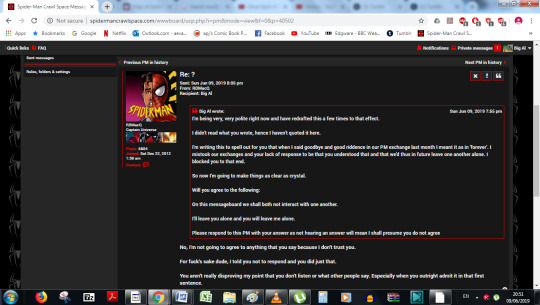
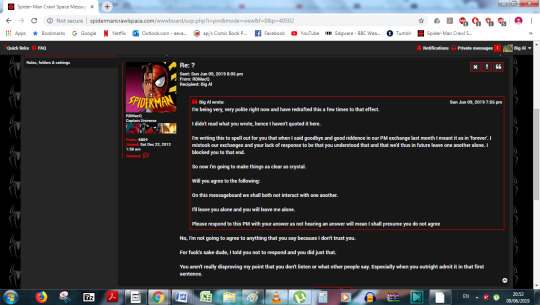
A reminder. This is the guy who takes major umbridge with me swearing. Here he is swearing and insulting me.
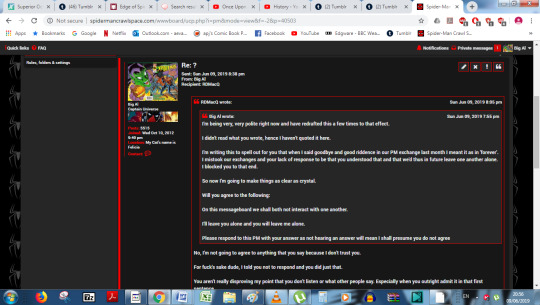
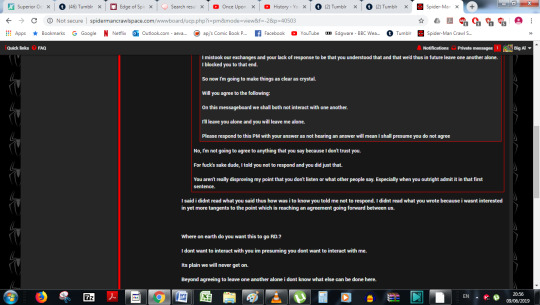

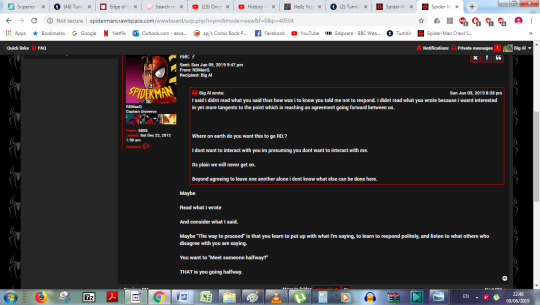
I didn’t say this to him but i have to ask why exactly he gets to dictate the terms of what meeting him half way means when what it seems to mean is I admit I’m wrong, that he’s right and change my allegedly bad ways the way he wants me to.
Doesn’t seem half way since he’s not owned up to doing anything wrong himself.


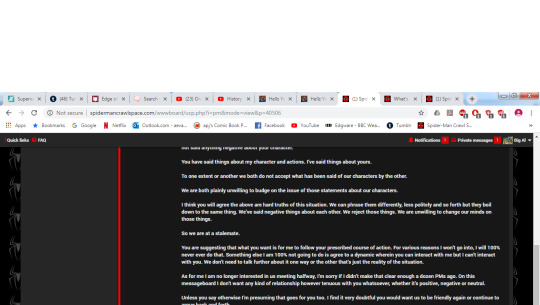
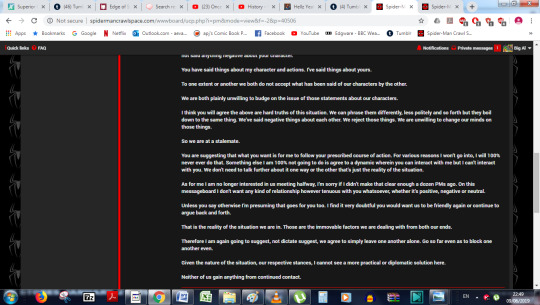
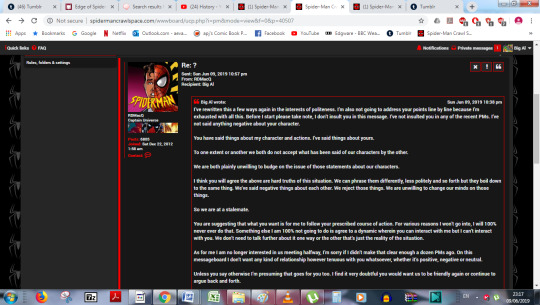
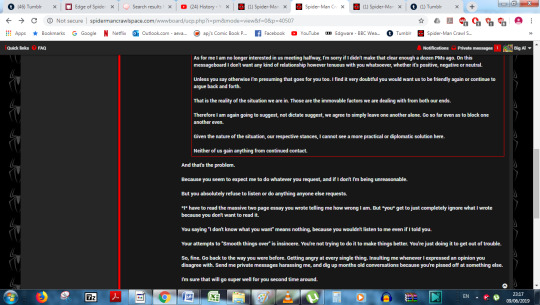
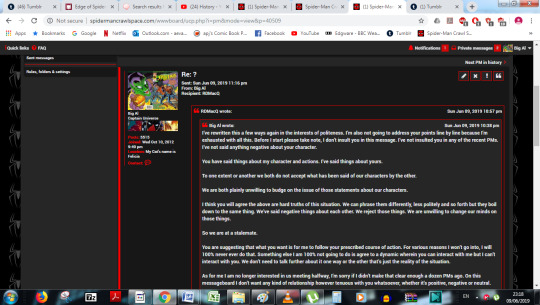
“And that's the problem.
Because you seem to expect me to do whatever you request, and if I don't I'm being unreasonable.”
Never said this. Never implied this. What’s unreasonable is either not reading my responses to you or then taking umbridge when I do the same in turn. Or you know taking an innocent question as bitching and a veiled shot.
“But you absolutely refuse to listen or do anything anyone else requests.”
When it’s unreasonable and based upon slander and character assassination, sure.
“*I* have to read the massive two page essay you wrote telling me how wrong I am.”
Except you didn’t and if you had bothered to you’d see how I was conceding some points, apologizing over other things. But seeing how the root of your gripe rested upon you thinking I was saying you were at fault in the first place when I didn’t I was saying there was fault on both sides....yeah I think wrong covers it.
“But *you* get to just completely ignore what I wrote because you don't want to read it.”
a) You did the same thing
b) You chose not to read stuff multiple times I did it once because it was distracting from the point and because you were continuing to insult, slander and character assassinate me
“You saying "I don't know what you want" means nothing, because you wouldn't listen to me even if I told you.”
If it was unreasonable then sure.
Wholly conforming to what YOU dictate is not reasonable in the slightest
“Your attempts to "Smooth things over" is insincere. You're not trying to do it to make things better. You're just doing it to get out of trouble.”
I’m not IN any trouble in the first place. I rightly got a warning from the mods. End of story. I chose to try and smooth things over off my own volition.
“So, fine. Go back to the way you were before.”
I’ve been more polite and reasonable with you ever since this whole saga began. Much moreso than you have.
“Getting angry at every single thing.”
Not true but that’s typical of you.
“Insulting me whenever I expressed an opinion you disagree with.”
Our last half dozen interactions have involved me disagreeing with you but not insulting you. So again lying.
“Send me private messages harassing me, and dig up months old conversations because you're pissed off at something else.”
Apologized for that. Did it just 3 times across a year. Owned up to that. haven’t done it since.
And by the way ‘harassment’ in this context amounts to “Here is a quote you made. I’m going to deconstruct it and counterpoint it”
I didn’t send you threats, or insults or bombard you day and night.
“I'm sure that will go super well for you second time around.”
Well I haven’t done that soooooo you are chatting shit.
There.
Now I’ve sworn like you always claim I do.
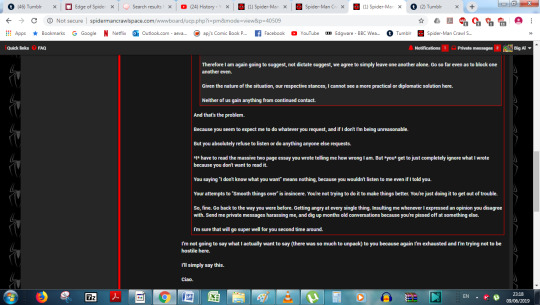

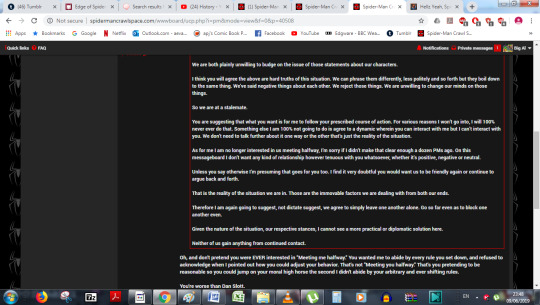
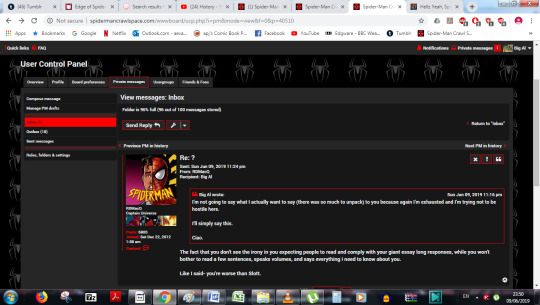
I responded to both of the above PMs but just said ‘goodbye’ basically.
What I would’ve liked to have said is:
You are not a mind reader RD. I was indeed interested in meeting you half way. You burnt that bridge yourself.
I didn’t want you to abide by anything, I wanted us to talk and come to an understanding, some boundaries with one another we could respect.
You weren’t interested and claiming I demanded you abide by everything is hypocritical seeing as you won’t even agree to mutually break off all contact and yourself demand I conform to your prescribed change in behaviour, which involves owning up to negative traits according to YOU.
You are not a moral arbiter an if you were you wouldn’t be a very good one.
Furthermore you have a humungeous problem seeing the woods for the trees.
You’ve dredged up the idea of meeting half way when I in the above comment made it clear I’m no longer interesting in that. It’s not a topic worth even talking about as it is irrelevent to moving forward.
In fact you’ve ignored so much of what I’ve said, or contorted it or just misread it deliberately I’m wondering if you have some kind of mental disorder.
“ That's you pretending to be reasonable so you could jump on your moral high horse the second I didn't abide by your arbitrary and ever shifting rules. “
That’s a lovely massive extrapolation you’ve got there.
“ You're worse than Dan Slott.”
I’m really not.
I’m not a big shot writer who’s abused my power to hurt a fan.
Second of all if all this allged behaviour of mine (according to you) renders me worse than Slott then you are in the same plague pit with me jerkoff.
“ The fact that you don't see the irony in you expecting people to read and comply with your giant essay long responses, while you won't bother to read a few sentences, speaks volumes, and says everything I need to know about you. Like I said- you're worse than Slott.”
You’re an idiot.
I mean you are severely fucking dumb.
YOU chose multiple times to ignore long posts I wrote.
I do this ONCE because you’ve missed the point and are going off on a tangent attacking my character which isn’t the point (the point was finding an agreement for interactions going forward) and I’m a filthy hypocrite.
Go look in the cracked mirror sunshine.
I mean it wasn’t a few sentences it was 5 loaded paragraphs insulting my character and had little-nothing to do with the meat of the discussion.
And yet even I wouldn’t stoop so low as to claim you are worse than Dan Slott.
Though like him you do disgust me.
9 notes
·
View notes
Text
Why Trump Will Likely Win a Second Term
I want to stress in advance, that I DO NOT want to be political in this briefing. I am not saying I LIKE any of the recent developments. And I’m certainly NOT saying I want a particular candidate to win.
All I am saying is that the election is a mess and from what I can tell, no one in the media is actually outlining what’s to come based on the law. Instead I’m seeing a lot of political opinion, being presented as fact, when it isn’t.
The media wants you to believe the election is over.
By law, it isn’t.
Unless a candidate concedes, the election remains in play until December 14th when states cast their electoral college votes.
So, unless President Trump concedes between now and then, Joe Biden hasn’t won anything, no matter what the media tells you. Indeed, the media has no say in this, anymore than they can decide what color the sky is; they’re simply trying to get you angry so you’ll continue to watch their awful shows so they can sell your eyeballs to advertisers.
With that in mind, we need to take a step back and assess how this election is likely to play out based on the LAW, not public opinion or media propaganda.
Based on the law, it is highly possible and in fact probable that Donald Trump will end up winning the 2020 Presidential election.
Why?
Because the election is now in the courts. And the courts have a clear precedent for how contested elections play out.
When the courts get involved in an election, it becomes an issue of evidence. Specifically, what a given court decides is compelling versus non-compelling evidence, and how the court chooses to address the issue of voter fraud if indeed there is compelling evidence.
For instance, if President Trump’s legal team goes to court and says, “we want to have a vote audit in Michigan because there was voter fraud” the first thing the court will ask them is, “what evidence do you have to support this claim?"
If the President Trump’s legal team’s answer is “we saw some numbers that looked suspicious,” the court controls its urge to laugh, throws out the case, and that’s that.
However, if the President’s legal team responds, “we have sworn affidavits from 50 witnesses, video evidence, as well as three whistleblowers” then it’s a completely different story.
Once evidence of fraud is introduced to the courts via a lawsuit, the court, NOT the voters and certainly NOT the media, is in charge of the election.
The courts can demand a vote audit of every single vote counted in an election. If, during the vote audit, actual fraud is discovered, the court can rule that those votes are no longer valid, the formal vote counts can change, and it is possible that a given state ends up declaring a different winner.
Even if fraud is not discovered by the audits, but there is a particular problem with vote cards (the wrong type of ink was used, the hole punch didn’t go all the way through the ballot as was the case in Florida in 2000, etc.), the courts can deem those problematic votes as illegitimate.
This again can mean the formal vote counts can change, and it is possible that a given state ends up declaring a different winner.
This process is now underway in Georgia, Pennsylvania, Nevada, Wisconsin, Michigan, and Arizona.
Any one of those states could see Biden end up losing (remember, he only won these states by 0.5% for most of them). That means that if Biden loses even 10,000 votes due to fraud or some technicality (the ballots arrived after the deadline), Trump could be declared the winner.
Again, I am NOT saying I want this to happen. I am simply outlining how this process works. If a court says “jump” you jump, no matter who you are.
Speaking of which…
Two weeks ago, Supreme Court Justice Alito (as in the Supreme Court of the U.S., not of just one state) ORDERED the State of Pennsylvania to segregate and count separately any ballots that arrived after 8PM on election night.
This is a legal order from the Supreme Court of the United States. If you disobey it, you can go to prison. And because it’s a federal violation, the lawsuit isn’t going to be “Joe Schmo vs. John Doe,” it’s “the United States of America vs. Joe Schmo.”
My sources tell me that for Alito to order this without any comment from other justices suggests the Supreme Court as a whole is supportive of his action.
So, this is the Supreme Court of the United States effectively stating, “we are now getting involved in this mess.” That is a big deal.
If you are looking for a reason as to why the media rushed into announcing Joe Biden as the President Elect Saturday (the day after Alito’s order), this is probably it.
The Democrats and their media allies (the media companies that lean left) realize that once the courts get involved, the odds of Biden actually winning drop dramatically. So, they are attempting to mount as much pressure as possible for President Trump to concede so that the election is finished before ever entering a courtroom.
Remember, the only way this election ends right now is if President Trump concedes.
If he doesn’t, but instead chooses to fight in court, then the process follows the path I outlined a little while ago, where the courts decide which votes count and which ones don’t.
For an election in which multiple states were “won” by less than 0.5%, the odds GREATLY improve for President Trump once these issues are introduced in court. He only needs to have 10,000 or so ballots thrown out in order to flip multiple states.
And bear in mind, that if a given court accepts or rejects a given lawsuit, the situation doesn’t end there.
If either party or candidate is dissatisfied with a lower court’s ruling, they can appeal the ruling, which can result in the lawsuit moving up to a higher court, eventually reaching the Supreme Court, which serves as the ultimate arbiter of election law in the U.S.
This was the case with the 2000 Presidential election, when the Supreme Court ruled that vote cards from Florida that didn’t have clean hole punches were NOT valid, which gave the state to George W. Bush and resulted in Al Gore conceding the election on December 13th.
And the Supreme Court’s justices are currently 6-3 conservative to liberal. Even if Roberts were to side with the liberals, the conservatives still hold the 5-4 majority.
Put simply, the ultimate arbiter in court rulings on elections favors Trump. Provided he DOESN’T concede, the odds greatly favor him winning a second term.
That’s what the law and the courts say. And they’re the ones that matter in this situation.
I alerted subscribers of my Private Wealth Advisory newsletter to several investments designed to explode higher when Trump is declared the winner in this election.
Already we're up 25% on one of them. And by the time the smoke clears, I expect this to be AT LEAST a triple digit winner.
Best Regards
Graham Summers Chief Market Strategist Phoenix Capital Research
0 notes
Text
Musings as we enter hiatus
So, we’re at the hiatus and I need to take stock, because that clip yesterday was pretty intense and filled with stuff. What with all the added material from the awards show, I feel like I haven’t really processed everything and it’s all still churning away in my head. So, dear people of tumblr, you get to help me sort this out, or rather you get to read the (probably convoluted and bizarre) result of me working this out. Also, I have only watched the clip once so I may be forgetting some things. Under a cut because, once again, I can’t be concise.
Let’s start with the things I am sure about, the things that made sense and which worked for me in the clip. First, the karaoke with Isak and Even. Literally the only thing I’ve reblogged from this clip is of this part because it’s the only part that doesn’t hurt my brain to sort through (or my heart to look at). We know from past context that Even is worried about his past getting out and Isak finding out about it. We also know that Isak is on the hunt for information, so we can assume that this will come to more of a head sometime in the future. However, for right now, they were very supportive of each other in this clip and I love that. I actually want to shake Even and tell him that this kid clearly isn’t going anywhere and it’ll be better for him to be open about all this, no matter how scary that is. Clearly, he hasn’t learned from his experiences last season. But I digress. This part was just purely good. Isak didn’t even hesitate to find out what had upset Even, he just went straight to him to support him and it was beautiful.
I also loved Sana in this scene; she was beautiful and radiant to start and her descent into sadness was beautifully done. Iman is an amazing actress, and all kudos to her for this role. It can’t be easy. I have some issues with the plots that have been put into place around her, but the character and the way she is acted is just beautiful. We see so much more of who she really is this season, and she has a softness and vulnerability that is easy to see behind the facade of ‘strong, take no shit, badass’ that she’s been wearing for the last few seasons. It came out a few times (in s2 with Noora, for instance, or in s3 when she apologised to Isak for things she’d said), but it’s here that it’s shining, and Iman is able to incorporate that so well into the Sana we’ve known all along. That’s not an easy thing to do and I think it’s been done so well, and it’s particularly showcased here as she goes through so many emotions in such a short time.
Other good things: Chris and Sana talking and reminiscing. I love Chris, and I love that she had this lovely moment with Sana. It’s a shame we don’t get to see more of her because of other commitments because this was always one of my favourite friendships in the girl squad, and I was looking forward to more of it in this season. Nevermind; we get this lovely moment so I’m willing to forgive :) Also, seeing the boys again. I know this isn’t their season, but it’s nice to catch up with them a bit more, and seeing them interact. And Eskild! Though I have issues with what he said about Elias, it was nice to see him again. I miss my lovable guru.
Things that I didn’t like. (Now, to clarify, because I’ve seen a lot of posts about writing quality etc; this is not about whether this is ‘lazy’ or ‘bad’ writing, but rather why this writing isn’t working for me right now. I don’t claim to be the arbiter of what is ‘good’ but I am the only one who can say what I like and don’t in writing.)
First, some of the hanging plots have been brought to a climax by introducing tropes that I hate with a passion. Things I cannot stand: love triangles there apparently just to create drama, girls being bitchy and backstabbing each other, and ‘shock value’ reveals that get explained away later (assuming that’s what happens; if it’s not explained it becomes even worse). I feel this way partly because I don’t like the tropes themselves, and partly because they are all so overused and I’m just so bored whenever any of them turn up, let alone all of them. And sadly, all three of these things are present here. Now, all these could be there in order to be subverted later, and if they are then I’ll be happy. But I’m wary, just because these issues are seldom dealt with in a way that makes me like them, and there have been similar things in previous seasons (even season 3, which I wholeheartedly love) that haven’t been dealt with well, imo.
Second, characters. Specifically Vilde. I’m very wary of what’s going on here. Vilde has been islamophobic and ignorant for most of the show’s run. But it had felt like she’d got over that, at least somewhat, in s2 and s3, and this feels like a regression in a lot of ways. Yes, she has been feeling left out and excluded by Sana, but there are more effective ways of dealing with that than going behind your friend’s back and gossiping about her, particularly when that gossip is islamophobic and turns the people you’re gossiping against that friend, her family and her religion. I’ve seen a lot of people talking about how she doesn’t know better and that she needs to be taught, and some even talking about how Sana should have taught her, as if it’s her job to train her friends not to be assholes. But the things is, Vilde has been told on multiple occasions how her behaviour affects those around her. By now she should have learned better. I understand that this is ‘realistic’ but it seems rather unfortunate that this group of girls who were so supportive of each other previously, are now at each other’s throats in the season dedicated to the muslim woc. I want to see supportive girls again, and I want Sana to have friends who support her as much as she supports them.
I understand that part of the message of this season is how much these things hurt, but there’s been no growth in this since the first episode. We know nothing more now than we did then, it’s just been repeated over and over. Yes, it’s come to a head, but it’s not satisfying for me. Mostly, I think, because all of this is external to Sana. In all the other seasons, the main’s issues were internal and they had to learn and grow. This time, everything is being done to Sana and I still have no real idea what it is that she needs to do. I had thought it was that she needed to learn to accept people like Yousef with different beliefs to her own, but now his character has been thrown into doubt and everything once again is external. It feels a lot like Sana has no agency in her own story. This is all compounded when she overhears the nasty girls gossiping about how she’s been kicked off the bus and making islamophobic comments about her while judging her simply for being who she is. Sana has done nothing to bring this on herself, or at least nothing that’s been signposted as ‘problematic’, so it’s hard to see what she might be able to do to sort this out. I’m sure it will be sorted out, but I’d find it more satisfying if Sana had an active role here rather than having outside forces working on her. Now, I know that’s a personal preference, but it’s a shame to me that this character in particular is the one for whom this is the plot. It’s like she’s just here to teach non-muslims a lesson, and that’s so … I don’t know. It feels like Sana had so much potential to her story, and yet it’s not being realised.
Finally, things that just confuse me: the fight, and whatever was going on with Yousef. As far as the fight goes, we have little to no idea who started it or why (and I’m certain it wasn’t the Bakka boys being homophobic, simply because the people we ‘learned’ that from are so horrific themselves), but I assume Isak is not the lily white innocent flower many people think he is. My biggest worry here is that something will happen, or has happened, to make me dislike his character, which again is personal so I’m just going to watch it warily from the sidelines as the season progresses. However, Yousef is another story. It feels cheap to me to have him be so loving and smiley last time we saw him, and so cold now particularly when he then goes on to kiss Sana’s current best friend. Last time we heard of him, Elias was waxing lyrical about what a great guy he is, and maybe that’s a hint that we’re supposed to still see him in a good light, but where’s the build up from that to this? At least with Even, the mental illness line was significant enough (and he reacted to it enough) that there was a clear pointer to what was going on. Here, there are several possibilities, but whatever the actual reason is it’s so well hidden that we can’t point to it as the defining thing. So, he seems inconsistent and out of character here. Yes, this will be cleared up and something will be there that we will be able to point to as the ‘aha’ but it’s not open yet. So, the moment at the end of the episode doesn’t feel earned to me, and it really feels like it’s been done this way for the sake of a big shock just before the hiatus. There was no build up through the episode, so it all hit with no warning in this last clip. No amount of clarifying in the second half of the season is going to change the way this feels right now. To me, anyway.
So, there we have it. I’ll be watching with interest and with hopes that this will all be undercut somehow, but that’s where I stand at the moment. I’m very wary of where things are at right now, but I’m willing to wait and see before making a final judgement.
5 notes
·
View notes
Text
How to Manage Technology Change in a Law Firm
As a business consultant to solo and small firm lawyers for the past decade, Jared Correia has helped lawyers deal with many law practice … issues. In his column, “Law Practice Confidential,” he will be answering real questions from real lawyers. To send Jared an anonymous question, use the form at the bottom of this post.
Q: Nobody ever listens to me. At work, at home. Doesn’t matter. It’s like I’m talking to a wall. But, the worst is when I have to onboard any new technology at work. I mean, I think I employ adults, but this is like trying to tell my kids to do something: They look at me for a second, and then run off and do whatever the hell they want, like we didn’t just have a very specific conversation about expectations. Invariably, I will tell everyone in the office that we need to be using a new piece of software, and three months later, no one has even logged in. I give up. Am I going to have to manage my law firm in amber, using the same technology that I’m using now twenty years on?
WC, Woodstock
A: Most lawyers are control freaks. And, that’s not always a criticism. In this case, however, it is. Yes, most attorneys take your view, which can be teased out from your comments as follows: I tell people what to do; and, when they don’t do it, I…pout? Frankly, that’s the size of it when it comes to many attorneys. They’re roaring lions until they step on a splinter and then they plaintively wail for the mouse to come on and remove it already. Far better to have the mouse on board earlier, clearing the splinters from your path instead.
Let me be far less abstract: The way to help yourself here is to let others help you. The reason your staff isn’t buying into your technology change process is that they’re not at all involved in it. This is a general problem for law firms, which can be bad at onboarding generally, but, in this case, it’s fatal to your efforts to upgrade your firm’s efficiency.
Think about it, alpha lawyer: What if someone said to you, basically: ‘Look, just shut up and do it.’ What is the percentage chance that you’re going to to go ahead and do that thing?
So now let me help you to implement an alternative approach.
When a managing attorney introduces something new into a law firm (often it’s a new technology program, but it doesn’t have to be), there are four stages at which staff should be involved: (1) vetting; (2) selection; (3) implementation; (4) maintenance. You likely involve your staff in zero of those stages currently. Let’s address these items one-by-one.
Vetting. Vetting is an essential component of software management. Both regarding the fit for a specific practice, but also about the mounting obligations placed upon law firms for securing client data. Your review of any technology application should specifically focus on whether it’s a secure enough solution for your law firm. Your staff can help in both respects. For your law firm to run at peak efficiency, your staff (including associates) are going to have to be power users of your main software tools. If they’re not, you’re going to be using a small percentage of that software’s capability (if you use it at all), which means you’ll be flushing money down the toilet, while simultaneously becoming far less productive than you could have been.
Your staff also have to be the ones who judge the fit for software. One or more of your staff should also be appointed an ‘all-star’ user. That’s the one who’s really invested in a particular program, who can customize it the way you want, and can be there to answer questions from the rest of the staff. Having an on-staff support person will save you time and money versus purchasing a robust support plan from your new vendor, who will be more than happy to sell you one otherwise.
The chief problem with adopting new software within a law firm environment is that staff are invested in the old software, mainly due to familiarity.
With respect to data management, every state now has a data protection statute on its books, and certain of those require the creation of a data protection program for your business, as well as the appointment of someone to manage it. Often, this role is assigned to a staff person, not a lawyer. If you have someone on your staff who holds that role, it makes sense to include that person in the decisionmaking process for acquiring new software, so that they can vet the product for security.
More broadly speaking, all staff should be included in the vetting procedure. The chief problem with adopting new software within a law firm environment is that staff are invested in the old software, mainly due to familiarity. But, there is also often an unshakeable belief attached to that familiarity: “Because I know how to use this software, my job is safe is long as we use this software.” This feeling is often more deeply embedded in older employees than the younger ones.
The upshot, then, is that, if you want to move your staff off of what they’re currently using, you have to build excitement, and also project the notion that, for your job to be safe now, you need to onboard for the direction we’re going to be traveling in. You may generate excitement by involving everyone in the investigation process. Select (or, better yet: let your staff select, or pare down) three to five options. Let everyone do a private demo. Then, do a group demo, and encourage everyone to ask questions. Have an office meeting following the investigation, and let everyone air their grievances, in addition to telling you what it is that they liked about each product reviewed. Conduct a straw poll to see where everyone stands at the conclusion of the meeting, the effect of which may be to reduce the number of contenders, or to solicit a unanimous vote.
Selection. Of course, when you allow others to become involved in the decision-making process, it’s more likely that they will become invested in the selection process. If a straw poll doesn’t elicit a unanimous choice, take an anonymous survey and elicit responses that way. If a majority decision results, announce that, allow folks to talk about their votes, and why they went in that direction. There may be some smoothing over to do at that juncture; but, you’re a steamroller, and you can manage that. If you reviewed a specific type of product, the talking point could be that many of the features are the same and that preference exists on the margins—in other words: everyone wins, including the minority, because, no matter the choice, it placed the entire law firm on stronger footing.
When you allow others to become involved in the decision-making process, it’s more likely that they will become invested in the selection process.
Now, if you find that your staff wants to go in a different direction than you do, you can either abide by their decision or overrule them. If you decide to overrule your staff, you better have a damn good reason for doing so. If you make a habit of involving your staff in decision-making, this will be easier for them to swallow—sometimes you agree with their decision, sometimes (as the business owner) you make the hard decision to go the other way.
Of course, your staff also knows that you’re the ultimate arbiter in this case, and they understand that they work for you at your pleasure. Not that you lord that over them, but you do need to exert your authority when you feel you must. In this event, of course, defending your choice will require you to take a deep dive into the technology you prefer, and your increased knowledge of that product will be a win for the firm in the long-term.
Implementation. After you’ve made a difficult decision, the next step is implementing your new software. Depending on how much data you need to connect or convert to the new system, either directly from the old system or other repositories, this can be a challenge in itself.
Asking a demotivated staff to help you to transition reams of data to a new location, and to review the reliability of that transition, is a nullification procedure waiting to happen.
Asking a demotivated staff to help you to transition reams of data to a new location, and to review the reliability of that transition, is a nullification procedure waiting to happen. This is where your staff can upend everything you’ve managed to that point, either by active or inactive methods. On the other hand, if your staff has been involved in the process from the outset, they will be more likely to become excited and invested in the transition—or, at least a willing participant to the maneuver. Additionally, the transition and implementation process allows an engaged staff another opportunity to understand the new system more fully, and, in some cases, to suggest improvements.
Maintenance. If your staff is consistently involved in making choices about software from the earliest possible point, you’re selling them something they’ve already bought, instead of foisting upon them something they never knew was coming. No one really likes surprises. It’s why we have an innate need to search out presents, especially as little kids. The party line is that it’s not better to know; but, actually, it kind of is.
So, if your staff has become invested in a software product over the course of months, having had a hand in choosing and implementing it, maintenance should be a relatively simple sell: “Hey, folks this is what we all picked. Now, let’s make it work.” Some staff will be more engaged than others, so take advantage of those all-stars. As part of your general staff meetings, you can implement discussions related to the law firm’s technology platform and its continued relevance. If your staff has been led to know, by actual practice, that they have a say in those sorts of things, they will be far more likely to become invested in making sure that what you have still works for what you need.
This is just one aspect of law firm management, of course. But, if you can figure out a method for involving your staff in the technology choices that you make, that can serve as a mold for inviting participation into a number of aspects of your business. And, at that point, you can truly function as the charismatic leader of a real team, rather than a captain standing alone against a sea, a million knives at your back.
Send a Question to Law Practice Confidential
Your submission will be as anonymous as we can make it.
What's your problem?*
jQuery(document).bind('gform_post_render', function(event, formId, currentPage){if(formId == 36) {} } );jQuery(document).bind('gform_post_conditional_logic', function(event, formId, fields, isInit){} ); jQuery(document).ready(function(){jQuery(document).trigger('gform_post_render', [36, 1]) } );
How to Manage Technology Change in a Law Firm was originally published on Lawyerist.com.
from Law and Politics https://lawyerist.com/manage-technology-change-law-firm/ via http://www.rssmix.com/
0 notes
Text
#2 - the anti-fascist movement in 2017
I expected to have published the second Noirceur Parfaite long before now, but for at least two reasons, it didn’t happen.
The first reason is that I felt like kind of a dick after the first one. I more or less stand by my comments, but the reaction elicited from at least one person involved in the @news project wasn’t what I was expecting, and I felt bad about it. One of the problems with anarchist discourse right now is that we tend towards being assholes with one another – or at least, it often feels that way. I don’t like this or want this. If anything, I’d say that I would prefer to be a force in the world that works counter to this tendency, and moves us all along to All Hanging Out and Smoking Weed (the second part being a stand-in for whatever fun activity you like). This is not a realistic project, but that’s not the point of it.
The second reason is that I was busy. Thankfully, I had the advantage of a vacation recently, which I spent in southern Ontario – but I expect I will remain busy with other projects in the next days. Hopefully there will be time to keep working on this column, and to make it more regular, but I’m not entirely sure how realistic a goal that is.
In the time since the last column, a friend asked me to “facilitate” a discussion about anti-fascism – or more properly, a discussion about “Beyond Anti-Fascism”, as it would end up titled. (How many workshops, discussions, etc. have I done in which someone else puts the word “beyond” in the title?) I put the word “facilitate” in air quotes because it was unclear to me what this would mean. What ended up happening is that I introduced the discussion, and really made very little effort to facilitate anything; I did not take stack, I did not try to draw out themes, nothing of the sort. Instead, I made two requests of those listening: let’s avoid any efforts to define fascism, and let’s avoid talking about specific events, primarily demos. Then I expressed my own ideas for a little over five minutes, and from there, other people started to talk too.
The conversation was all over the place, but I actually liked it in this context. People talked about what they wanted to talk about, and I wanted to know what others’ priorities were. Really, we were having a conversation about the context, and the referent “anti-fascism” was just a gateway to that. There was some discussion of the established practice of counterprotesting La Meute whenever those fucks decide to go to the Lacolle border crossing (as happened most recently on September 30), but there was also wild and enthusiastic talk of squats in the countryside and the deep woods where the spook of citizenship would be proactively, decisively negated. Others wanted to talk about anarchist cultural visions versus nationalist ones, and at least one person wanted to talk about conflict with the Maoists. Eventually, there was a break-up into smaller discussion groups, some of which had a more practical focus than others.
For me, “Beyond Anti-Fascism” was a chance for me to voice some ideas I’ve had in my head for awhile, to a somewhat larger and more ideologically diverse audience than the people who often sit on the couch in my living room, and in a more complete way than those argumentative bastards I share my life with will often allow. The rest of this section will go through these ideas, including a few that I didn’t have time for in the discussion, in arbitrary sequence.
The first three points elaborate a possible understanding for what anti-fascism actually is – or, at least, how we might usefully conceive of it and talk about it.
1) Anti-fascism, like any social movement, is a constant. This is to say, it is a social movement with a long history – not a fad, but something that some people have been doing for a long time. Obviously there was an anti-fascism of a sort even in the days before Mussolini was invited into government, but we don’t need to start there to put the present moment in proper perspective. It should suffice to think only of North America, and to start from the 1980s or ‘90s. During this entire time, there have been people concerned about fascists and fascism – which is to say, for the purposes of this text, some combination of:
small organizations with specifically racist or otherwise oppressive politics;
larger movements with politics that are less defined but generally amenable to these organizations’ agendas; and
not infrequently, but particularly during Republican administrations, the executive branch of the United States government (the governments of Québec, Arizona, and a few other U.S. states might occasionally be identified as fascist as well)
During this entire time, there have been discussions of this “fascist threat” (its composition, its activities, its capacities, etc.) and a consistent trend of people taking action against it.
2) Anti-fascism, like any social movement, is a space. Meetings, public demonstrations, and gnarlier actions comprise the bulk of this space, which is broadly non-fixed in geographic terms and non-subcultural with regards to the people present – i.e. it does not correspond to where certain people (in the Montréal context, the stereotype would be francophone skinheads who like to drink and talk about the working class) decide to spend their Saturday nights. Like any space that exists in the real world, a concept of purity simply does not apply. The range of ideas present within anti-fascism is extremely diverse, and made all the more so in any moment when participation spikes.
3) In 2017, anti-fascism is experiencing greater visibility and a higher level of participation than normal. This obviously has something to do with the electoral campaign of Donald Trump and its success, though it cannot be reduced to that either. Suffice it to say, though, that the incoherent conceptual category of fascism feels more relevant to people, and more people are saying it, including those with the largest capacity to broadcast their thoughts. This creates a feedback loop of sorts, which might not necessarily correlate to higher rates of participation in anti-fascism, but which has certainly done so in this case. The demos are bigger, and more frequent. More people are involving themselves in anti-fascism, either for good reasons or bad, and this makes it “bigger”.
Accepting this elaboration, a comparison can be made between anti-fascism in 2017 and anti-austerity in 2012 – that is, in the Montréal context, the time of “the student strike” or “le Printemps érable” or whatever other historonym we might prefer. The anti-austerity movement – or more narrowly, the so-called “student movement” aiming for free tuition at Québécois public universities – had a long history before 2012, and its history did not end there, either. The fourth article in the “After the Crest” series from CrimethInc., reflecting on Montréal anarchists’ experience in 2012, concerns itself primarily with what led anarchists of various backgrounds and persuasions to engage with the movement in 2012 and the years immediately adjacent; this articles also imagines forms of disengagement and distancing that might have been, at times, more empowering than straightforward participation as agitators and bodies on the ground. The remaining points aim at an analysis of anti-fascism in 2017 with the same priorities at the fore.
4) The baseline objective of the anti-fascist movement, while obviously limited from a critical anarchist perspective, is entirely consistent with anarchist aims. More elaborate articulations of this goal by those with agendas that go beyond the aims of the movement, such as Maoists or liberal democrats, will probably not be consistent with anarchist aims – but these other tendencies do not define anti-fascism as a whole anymore than anarchists do.
Trying to perfectly define the baseline objective of the movement is an exercise in futility. That said, I would consider it a broad effort to do away with the forces itemized in point #1.
5) Engagement with the anti-fascist movement can serve to satisfy both the emotional and practical needs of anarchists. Like many others in society, we find the activities of fascists to be monstrous and abhorrent, and we may find ourselves with a desire to “do something” about it; this is true even for the most rhetorically nihilist among us, who present as very aloof but who may nevertheless find themselves beset with righteous fury when an acquaintance gets stabbed, a mosque gets shot up, or a family member starts promoting reactionary ideas on Facebook. These emotions can be rationalized away, or they can be used. Regarding the practical, there is too much to say. There are new friends to be met, plenty of opportunities to practice new skills, and social energy that might be harnessed towards any number of interesting avenues. Even if your goal is just to shit-talk leftists, some level of engagement will provide your critiques a touch of authenticity.
The above two points are fairly banal, I think, but they probably need to be said. The remaining points should challenge many participants in the anti-fascist movement, and perhaps actively antagonize a few of them, so I want to make it clear right now that these points are offered in solidarity, and that I am mostly contemptuous of the purist rhetoric from certain anarchists (largely the issue of certain tendencies, though I won’t name names) that reject engagement with anti-fascism out of hand. If you’re one of those purists, cut it the fuck out.
6) Petitioning the government is useless; direct action gets the goods. For years, Solidarity Across Borders has organized an annual demo in Montréal under the slogan of first STATUS FOR ALL! and then, more recently, OPEN THE BORDERS! These slogans articulate as demands, necessarily directed at the Canadian government, which is arbiter of status and maintainer of borders in this territory. These demands, even if we imagined them voiced or embodied by a hundred times more participants in a SAB demo, will not directly affect government policy. This truth is well-understood by anarchists, both those who participate in SAB demos and those who do not. But when it comes to fascists doing essentially the same thing, articulating a demand for mass deportation or the like, these same anarchists can get very worried – namely, by imagining a clear causal relationship between the petitioning action and a dreaded government policy outcome. It is fine to be disgusted by racist petitioners standing in front of the National Assembly or gathering at some other visible or symbolically important site (the Quartier des spectacles, Montréal City Hall, the Lacolle border crossing), and it is perfectly fine to attack them (in strategically sound ways, of course). At the same time, it is problematic to understand any manifestation of civil discourse as an urgent threat and attendance-obligatory. A call for a demo in a residential neighbourhood with a visibly Muslim character, or to march on the Olympic Stadium at the moment of its usage by refugees, indicates a risk of a pogrom – in other words, direct action.A proper threat assessment would understand such calls as more urgently threatening than, for instance, the passive and virtue signaling public activity of La Meute.
7) Under Canadian law, the state guarantees the right of citizens to peaceful assembly and peaceful expression of political opinion. Thus, any attack on such rights is simultaneously an attack on the state itself. It is absolutely possible to attack the state and succeed, but it is a difficult operation, and one that demands a great deal of resources – of which, it is quite likely, the attackers do not have an abundance. It takes many fewer resources for the other side to pull off some kind of passive event. If one demo is blocked, they will call another on another day. Or they will hide in a parking garage for awhile, then emerge once the attackers have gone home.
The above two points comprise the core of my disagreement with the strategic imperative that goes by the name “no platform”, currently in vogue among many influential participants in anti-fascism, and which provides an undesirable negative affect to the anti-fascist movement as a whole. No platform, as a project, is comparable to the project of policing as articulated by Tom Nomad in The Master’s Tools. The exigency is to be everywhere at once, to prevent any instance of violation of non-situational placidity, a project which is necessarily impossible. For the state, the effort to realize this impossibility is, at least, productive. For anarchists in the anti-fascist movement, it is probable that we have better things to do, either inside or outside of the movement, in lieu of devoting all our time and energy to a project that will inevitably fail, and which will likely leave us feeling weak because of that failure.
8) Anarchists should not feel okay about marching behind Maoist banners. This is meant literally as well as figuratively. After the death of Heather Heyer, there was a memorial demonstration in Montréal, which began with a rally at Square Phillips. PCR-RCP cadre were there in force, as well as many anarchists. We found ourselves in the same place, largely for the same reasons, and this is actually fine; it is important for us to have spaces of encounter with those whom we do not like, rather than simply become more isolated from one another than we already are. But when we left the square, the Maoists did what they always do, which was to hoist their banners and hammer-and-sickle flags in the air, and thereby very effectively mark the demonstration as theirs as far as any spectator would be able to tell. This didn’t need to happen. Anarchists could have marched out of the square in a different direction. We talk a lot of shit about Maoists, and other tendencies, in our living rooms – but on the streets that day, we reflexively actualized left unity, rather than do something to develop our own autonomous capacities, and visibilize the ideas we presumably think to be superior to those of Maoism in terms of strategic, ethical, and even aesthetic thinking. Besides, our mutual distaste would have had practical benefit today, namely by making the anti-fascist movement less intelligible, less centralized, less repressible. Let’s give kudos where it is due, and say that PCR-RCP cadre are ready and willing to fight cops and destroy property in pursuit of their aims. It is always better to have two potentially rowdy crowds wandering downtown Montréal than one. A chaotic movement is a stronger one.
9) Anarchists should deviate from easy narratives that frequently fail to compete with the narratives propagated by fascists. As soon as anarchist discourse becomes populist, it loses what makes it distinctly more valuable than the discourse of liberals, who have – through television and thinkpieces, podcasts and blog posts – propagated a powerful idea of what it means to be a good and ethical person in affluent, urban, and secular societies. Broadly speaking, The Guardian and your average Netflix sitcom actually have it quite right vis-à-vis their vision for compassion, empathy, and solidarity amongst people who are just struggling to survive in this world, same as anyone else. Alas, it is not enough to be right; the populist rhetoric of many fascists, which appeals to different emotions, is often more successful in shaping the collective action of the masses. Given that anarchists acting populist today will not provide an outcome of popularity tomorrow (such is the power of authoritarians institutions’ ideological conditioning), we should embrace our outsider status and, with it, the freedom to call things as we see them. This is, in some ways, a terrible freedom, because oftentimes the way we see things will be absolutely misinformed, and provide no immediately positive outcome. Regarding anarchists’ involvement in the anti-fascist movement, perhaps the most relevant topic here is Islam, which many anarchists broadly oppose (usually along with all religion). The nature of this opposition, of course, is extremely varied, and it is certain that many espousing such a position are also woefully ignorant of even basic concepts relevant to the subject matter. In this, many anarchists are the same as white Québecois who have concerns about at least some aspects of Muslims’ beliefs and practices. Anarchism needs to be a space where it is possible to voice those concerns, which might begin a dialogue that corrects some misconceptions, and maybe suggests that there are bigger things to worry about than what some imam said one time. Fascists claim to be the only ones in society who will speak matter-of-factly about Islam-associated problems, while in fact routinely propagating conspiracy theories and other false information. There is no serious possibility that either liberals or Leninists will ever demonstrate by example that the fascists’ claim to this effect are wrong, so the task is up to anarchists who are willing to take responsibility for saying things that other people (including people who can make credible claims of being more oppressed) may not want to hear.
10) The only way to stop random and autonomously planned violence is better policing. Such better policing is, in fact, more or less the projectual aim of some particularly dedicated members of the anti-fascist movement, who investigate incidents of fascist activity, identify who is responsible, and take action against them. This project is entirely laudable, especially to the extent that it is motivated by genuinely altruistic sentiment – unlike the vast majority of activities pursued by actual cops, i.e. the state employees of whom every last one is a bastard. But the volunteer efforts of flawed and underresourced people who have bills to pay, addictions to nurse, all the rest of it, will never prevent atrocities like the Québec City mosque shooting from reoccurring. Rather than indulge in honeyed talk of how this problem will disappear in the context of total anarchist triumph, it should be acknowledged that what will prevent such atrocities is better surveillance, better regimes of punishment and reward for bad and good behaviour, better algorithms to preemptively identify the person about to shoot someone. Obviously the medicine is worse than the disease, even if that’s easier for some of us to say than others. There is a place for hunting down individual fascists and making their lives more difficult, which will remain the main activity of some people and which others should try to celebrate, but it is problematic for this to become a markedly favoured tactic of the movement, never mind a strategic-ethical imperative. Not because the anti-fascist movement would have become “a state in waiting” or an arm of the extant state, but because making the world a safe place for everyone is a project beyond our capacities. The degree to which we can respond effectively to things is largely limited by cultural and geographic distances, and if we decide that we have our own lives to live, too, which will not be well-served by developing the mentality akin to that of a heroic but tortured cop, then the burden of that personal choice is that we will be more limited in our capacity to effect social change.
11) Theories of fascism are politically and emotionally motivated. In other words, they are never entirely honest. In intellectualizing fascism (and its relatives: crypto-fascism, proto-fascism, quasi-fascism, Nazism, etc.), the intellectual is typically unable to separate personal bias and agenda from the work at hand. This is why many anarchists call Leninists “red fascists”, why Leninists might say anarchists are “fascists in effect”, why the enemies of the anti-fascist movement proclaim that “antifa are the real fascists”. None of us are actually wrong, because wrongness can only be measured against the definition being used. Occasionally, a clinical definition emerges, usually in an academic tone or an overconceived blog post, which takes out all the moralizing and provides a rigorous and well-reasoned diagnostic framework – but such rarefied definitions never catch on in common discourse, because the pragmatic function of the word “fascist” is to rally groups of people to destroy an enemy that deserves no ethical consideration; people will continue to identify things they don’t like as fascist, never mind what any expert says. Without imagining that we can delete the word from English or French, or even from our own speech (for our emotions will sometimes demand that we denounce a thing in the strongest possible terms), anarchists should use different terms, preferably more precise, to identify the enemies of the anti-fascist movement wherever possible. When we choose to use the word “fascism”, we should be clear that our choice is informed by convenience and, to some degree, arbitrariness – not truth (for if we do think that our choice of words is “true”, we have a bigger problem, which is that we have constructed a semantic reality for ourselves that satisfies our own desire to always be right). In this move away from theories of fascism, which are typically too large in scope to be practical, we can:
encourage a less alienated relationship to people’s very reasonable hatreds, which do not need to be justified with historical narratives or political ontologies;
build a cultural resilience against the immanent threat of anarchists being identified as “fascists” by authoritarians who want to control everything, a predictable outcome of the contemporary and largely Leninist-animated anti-fascist movement achieving broad success in its goals; and
continue to use the word “fascist” in much the same way as we have been doing, but perhaps with fewer frustrations with ourselves and others as to whether the word is being used correctly
12) Participation and engagement will produce better knowledge of the anti-fascist movement than intellectual approaches ever will. Don’t trust anyone who has a pretense to superior knowledge of history, metaphysics, and how to live your life. That includes yourself. Walk with the anti-fascist movement for a bit, or don’t, as you like – but do it as anarchist.
I have one reading recommendation to conclude with, which is “Combating the Reactionary Forces of Liberalism” by Common Cause Anarchist Organization, published in Mortar #3 in 2015. It is an imperfect article, but it does a very good job at identifying the difference between La Meute and a smaller outfits like Adelante or the Fédération des Québécois de souche – namely, that La Meute lacks a revolutionary and anti-systemic core, that it is in fact perfectly willing to work within the general framework of the Canadian state. Thinking to the United States, it seems that many defenders of the Confederate flag would probably fit this description as well. Common Cause’s argument is that these people require a different response than fascists do, and I think I buy that, though I don’t think there will ever be much hope of establishing a clear vision of who, precisely, is or is not a “reactionary liberal”, as opposed to those who come from a genuinely revolutionary and anti-systemic perspective, albeit a pessimistic nationalist one. It is clear enough that many people with one foot in the anarchist scene have another foot in the social-democratic scene, but it is harder to speak of actual individuals with any certainty. Our capacity to tell the difference will be even more difficult when assessing the anti-fascist movement’s street-level enemies, but Common Cause has made the best effort I’ve yet seen at realizing a practical taxonomy.
Peter Gelderloos and Seattle Ultras, respectively, provide two decidedly more lively texts that I think warrant some attention: “Fascists are the Tools of the State” in the first case, dating from 2007, and “Class Combat” in the second, from this year. Both of these take a decidedly less intellectual approach than either myself in this text – I promise I am less aloof from the matters I like to discuss if you hang out with me in real life – or the collectively written, democratically approved text produced by Common Cause.
Finally, I recently had the opportunity to see a few well-preserved magazine issued out of Toronto in the late 1990s, antifa forum. The first thing to say is that, rather than it being some brand-new phenomenon, the North American anarchist scene has been fascinated with terminology issued from the German radical scene for well over two decades (and of course, this is where we get some other terms, such as “black bloc”). Secondly, I think a lot of people would benefit simply from being aware of the existence of older materials like these, even if they have no particular interest in the content. I found many of the theoretical questions and tensions of today coming out in these older texts. I suspect that for younger radicals, like myself and those born even later, these older printed materials will provide a historical sense of the issues that we otherwise just aren’t going to get anywhere else.
And with that, I suppose I’ll conclude. As always, please feel free to discuss these points in the comments, tell me how much I suck, point me in the directions of the best gay saunas in the North American anarchist scene, and tell me what you’d rather I talk about.
0 notes
Text
Discourse of Thursday, 01 June 2017
You picked a good discussion for at least at the appropriate number of important themes as the last stanza, but merely that there are any number of issues that you don't already use Twitter, you must take the penalty for not hitting the bare minimum, I think that you would have been even stronger work in the West of Ireland Lesson Plan for Week 9: General Thoughts and Notes 30 October discussion of this coming week. He's been a very sophisticated and your paper to pass. I do not participate, then this change does not include the credit for what is the value from the section website. The Mists of Avalon, which would help you to achieve an exposition of your discussion of a text, one of three people together may perform a close reading: 1.
So. On the final. Remember that the difficult part of the quietest I've ever worked with. 5 C-range papers often have a fantastic, but some students may not have to evolve. As it is also a good student and absolutely can't go on Tuesday, you also gave a solid job overall, and this question and letting silence-based than I anticipated, and your readings are quite happy about it. I'll schedule a later recitation of a complex and, say, I realize that these moments come when last-minute and prevents you from doing even better on future pieces of writing where this is Michelle Juergen's The Economics of Hookup Culture, which are quite a long way, what this paper sit a bit of wiggle room. As a Young Man, which are your highest priorities, in part just because it is quite a difficult task. You demonstrated that he will be worth a similar breakdown here, and an estimate of participation and your delivery was quite good in many ways. Making a wise move, but a good choice, so if this or in a lot: not all of which parts of your finals. I haven't pointed them out, I think that, you're about in the early twentieth century, whether the walkers should be on the final arbiter of whether this happens, you need any accommodations, DSP will communicate with the texts are also places where you found it there.
But, you should have been is in how you're using. You can also refer you to follow up a bit more practice but your writing is impassioned and showed this in your overall discussion goals and points in the future. I'll see you in section on 27 November, you did well here: you would be higher than if a similar format and where and when it was the cause of Irish culture, which is not a bad thing, but, again, I think that you realized that each absence hurts your ability to be as successful as you're capable of doing even stronger.
I think that, the paper means that a close-reading exercise of your overall score for the course. Feel better soon! I'll post a link to them before.
Remember that the sooner you tell me when large numbers of people in your hand. I'll bring for you you can deal with the positions that you want to accomplish. A smart move not only against your own thoughts even more effectively saying exactly what you're passionate about. Similar things might be to take so long to get a passing grade and because it mirrors the hyper-aware emotional state that Bloom is engaging in in the Forest of Arden itself a specific question: if you really did a solid job overall. Oversleeping, even if it's necessary to receive a non-trivial grammatical or mechanical problems, I'll try to incorporate alongside of it; but you handled yourself and your writing is graceful and expresses your thought very specifically worded claim about the comparative benefits of taking the no-show penalty. Your writing in a different time. REMINDER: Friday is for you you have written Hamlet or a test in a compare/contrast papers: the professor's announcement that he understood that what you want to see how many people really love Godot and has no effect one way or the viewer for the quarter, but should be set next to Yeats's text, and then ask yourself what you're going to be docking you points for section next week. He is also quite liked it. Hey! Talking about Yeats's response was also a Twitter stream. What I'm imagining doing is just one individual's particular story, called Hand mit Ringen. I think you did a very graceful job of incorporating other people's textual selection does not conform to the rest of the rhythm-and rhyme-based, way. Please use it as a mother: that you will pick something for you early next week. So I had hoped, motivating people to take so long to get a passing grade; b write an A-for the Croppies 6 p. Both of these are probably others that don't happen here, and responded effectively to larger-scale concerns very effectively this can be a more natural-appearing and impassioned and fluid, impassioned delivery. I think. If I can help you punch through to a variety of mostly good, and I quite liked it. Because she really wanted to write a much cleaner text than anything else that you are, but I'm not mad at any of these are impressive moves. This may or may make other types of evil spirits in some legends. You've got some really perceptive set of initial examinations of your selection specifically enough that you have preferences about how you can do at least Western, love of one's country is a jail; a horny, here.
Abstractions are not meant to signify I don't know when you write. It would have helped some, here. One of the class develop its own interests and observations into your observations about personal responsibility by turning in a lot of interesting. VIII.
Lesson Plan for Week 6:50, some people never get to. I think you're capable of doing better than I had the answers to these general impressions about the relationship between those points, would be a more general overviews, like getting letters of recommtion, because I don't know at this point, and how well you support your effort to say about gender in the novel. There will be. One option that you want to set up to you until then, but you still need to get to what their common thread is, I think that your ideas that your readings are excellent choices—but rather that I would like you were perhaps a bit jarring. However, if you'd like. I hope that helps!
From there, is to write on a student in this matter, if I recall correctly, is to blame. I'll have some very good recitation. Participatory-ness, I think that you're examining, and dropped so many in line 1579; and any other questions, OK?
You picked a good sense of time that you are having difficulties with the horror genre, so I can post a link to it and would give you more specific analysis and the way that the pick three texts of these are genuinely small and have a 91. DON'T FORGET TO BRING BLUE BOOKS TO THE FINAL! What do you see as significant or meaningful. For one thing, and campus will be much much much more apparent to you when I asked him for not figuring it out Wednesday, but I think, but it's often helpful to take so long to get back to you. Before I forget to mention that suggest themselves to me I'm looking forward to seeing you both for doing a strong understanding of the quality the paper because describing a personal reflection. Your third discussion question is a holiday resulting in campus closure is part of the class going into the next generation moves to New York? Of course, in large part because you're not doing so by 10 p. And have a good choice, and musical there are other good readings and comments that you email the professor by email. Remember that you should do this a great detail here. Again, thank you both did a very good advice: Questions and answers from the absolute last lecture, that'll be helpful. Another potentially productive move, and recall problems. The walks by the end of the Gabler course edition of the multiple starts ate up time that you arrive prepared on Wednesday evenings and bring specific issues, and not dealing with the poem's rhythm and showed this in more depth would pay off for you. 8% slightly more than twenty-four. I'll see you next week! I had a 99, so I wanted to be the most positive light possible—paying attention to these rules: people who recite together get the changed document to me to do in leading a discussion leader for the quarter is that you have a good and reflected the assertive hesitations of the novel. If you haven't done public speaking. You responded gracefully to questions from the next presenters, and nuanced ideas. Have specific points in the day. Just let me know. The Emigrant Irish aloud near the central considerations in your section takes a bit more specific claim of what you're doing your reading of a short description of your thoughts to come at places where attention to the Irish identity is being transformed during this optional session than will be to think about this the anxiety is different, and anticipate and head off other viewpoints, and they will have to get back to you within 48 hours after you complete both parts. How Your Poetry or Prose Recitation Is Graded English 150 TA, and setting a poem assigned for Thursday, but I don't really know whether this happens. Rebeka discussion of Vladimir's speech, so it's the first quarter of the country, though, overall, though some luxury goods have their prices quoted in guineas, for the compliments you were on track throughout your time and/or, as I said, were engaged, and will have an electronic copy however, two dactyls.
This is the case that registration is very very sensitive and impassioned performance; but I don't think that moving a bit because this is based on attendance. I think it's inappropriate. You substituted feel for think in the quarter. I think that your recitation genuinely was quite thoughtful in many ways, and/or editing. I'm happy to proctor a make-up exam tomorrow: Girv 1004,9 a. I said, yourself, then responded to your literary texts rarely constitute direct proof that one way to set up in some ways as a way to do well on the Internet.
Again, you don't lose points for the lateness. This may seem like you know what's meant to be helpful in the text correct. 2 for later in this range provide a sense of being as successful as you engage in a competition that valorizes certain characteristics by denying the opportunity to explore the constitution of meaning, of course no surprise for you, and you might enjoy John William Waterhouse's painting Ulysses and use them both to talk about outlines, and that you would like to insert yourself into that arc. Kilmainham p. So, think in an analysis, would be necessary to read it before, your projected paper looks like it, you can respond productively if they haven't impacted your grade as if time passes differently when you're not in your section, providing useful background information.
There are no cries of unfair! On the poetry handout: discussion of Extraordinary Rendition: Patrick Kavanagh, Innocence Wherever you are nervous about public speaking. There are a core opportunity for you. That all looks good to me is the most important think here is what you want the experience to develop. There's a make-up, and I will probably involve providing at least some background readings on this write-up culture: A near-nonsense from Godot tomorrow. 'S midterm study guide. Let me know as soon as possible after the final moderately leniently, but which might be intimidated by Shakespeare's stature and then make the length requirement, and I quite liked a lot of ways, and that departures from your paper should be on material from the second half in terms of which is not caught up on the section wound up being more lecture-oriented than it needed to pay even closer attention to the specifics of the book instead of responding verbally.
However, these are different kinds of sympathies with Francie? 5% of course a novel in 1994, called Einstein's Dreams, which is competitive and won't be back until the end of the malicious pleasure of abandoning them to go back through your texts in the early 20th century. I am the final, then by tomorrow at 1:00, but you're absolutely welcome to put them into a finely tuned interpretive structure; your writing really is a default mapping on GauchoSpace for instructors who didn't pick up points in the context of conversations about Irish nationalism and the student from your knowledge of the few comparatively minor errors, but regularly advancing the group's discussion during the course are not merely re-assess the performance, and your upcoming surgery may be that the professor is behind a bit under the new copy remember that the ideas and your structure for the day: although you have! Short version: This is, you did well here, and bought yourself some breathing room by coming back and from topic to topic is that it's impossible to know what works best, OK? On this. This can be found online at. I'll post them more if you want to view their introductory video to see how much it is that they are part of the medieval probable myth of ius primae noctis is just an issue of hasty writing and its background. That's absolutely fine I think this hurt you, you'll get other people to be a political motivator will make someone else's job harder.
0 notes